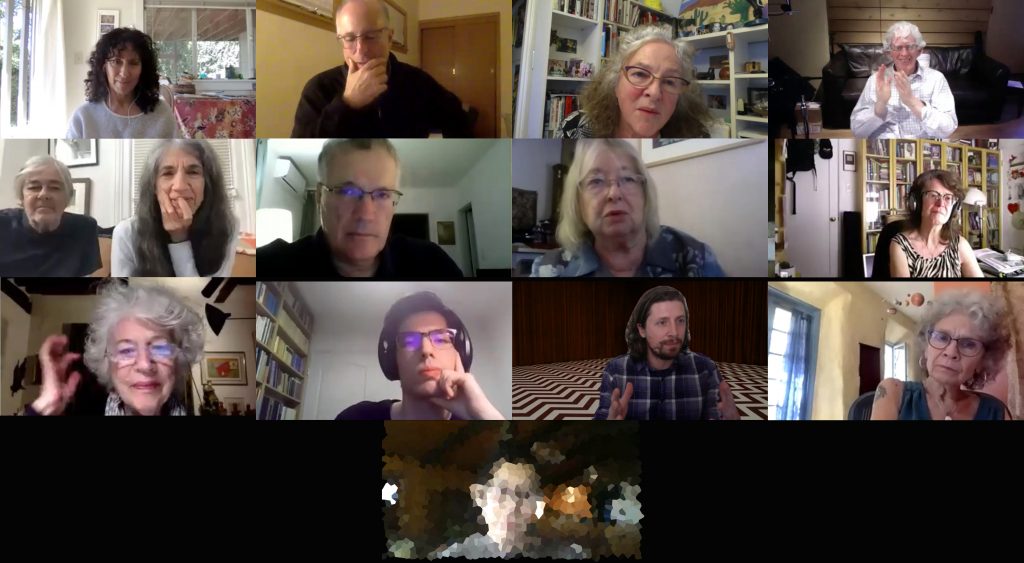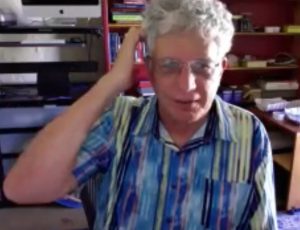We will arrive at the universal not by abandoning our particularity but by turning it into a way of reaching others, by virtue of that mysterious affinity which makes situations mutually understandable. — Maurice Merleau-Ponty

A wonderful thing happened recently. On October 4th and on October 11th thirteen filmmakers, writers, curators and editors met on Zoom to critique the first cut of The Restless Hungarian Film. I had been anticipating these dates with great excitement and (let’s be honest) some trepidation. I have been editing the film for ten months in complete isolation. This is partly because of COVID, but mostly it’s because, especially on this project, I am a one-man band: writer, director, producer, narrator and editor relishing the complete freedom from outside expectations. What goes with this freedom is the worry that, in telling a personal story, I could be engaging in a colossal self-deception, creating a work that only has resonance for an audience of one.
Throughout the Restless Hungarian project, both the book and the film, there has been this tension between doing my due diligence as a journalist and documentary filmmaker and telling a personal story. On the one hand, I felt it my responsibility to honestly portray the life and times of a great man, my father Paul Weidlinger. On the other hand is the story of the tangled relationship with the woman who was his wife, the girl who was his daughter, and the small boy, teenager, and grown man who was his son. In writing the book I brought myself kicking and screaming into the story. It felt incredibly vulnerable. The film has been much harder because the “real estate” is limited. A film lasts two hours or less. It takes about 10 hours to read the book. That’s a lot more space for historical and cultural context.

A writer whom I admire once told me “specificity is generosity.” She meant that the details in a story are what make it come alive, what makes it both unique and true. In the book I wanted the reader to see my father acting against the (detailed) backgrounds of the rise of modernism, the Holocaust, and the Cold War, so I took the time and space to write about this context. The opposite of being specific is to generalize. A single tight line of narration in a documentary film can sum up a vast swath of history and experience, but is it satisfying? Is it generous?
My biggest worry about the impending meeting with my advisors was that they would reproach me for abandoning journalistic principals, for clouding an honest, straight-up narrative about Paul Weidlinger with my own personal shit about my family. In the past I felt that there was something impure, manipulative, and heretical about bringing oneself into the story. I absolutely hated the sloppy films of Michael Moore (Bowling for Columbine, Fahrenheit 9/11) where the film becomes as much about him as the heartbreaking issues he addresses.
I need not have worried. The advisors liked the film, but noted that its structure reflected my ambivalence. Almost unanimously they did the opposite of what I had feared. “Be more present in your film,” they said. “Don’t feel obliged to give us boring history lessons. Tell us how you feel about what went on in your family.”
My question to them:
How do I put myself into the story without it becoming narcissistic and self-conscious?
Their response:
Tell your truth, simply and honestly and it will resonate with others.
My reaction was deep gratitude.
There is a great deal of work left to do, but now I know where I am headed.
Diana R Roome
November 15, 2020 at 3:17 pmBy revealing your own need to tell your father’s story, you help us confront our own profound connections. The long-term effects family members have on one another are a universal experience, and by being honest and open about yours, you inspire others to look closely. That’s an act of compassion. I so look forward to your film!
Rhoda Nussbaum
October 20, 2020 at 5:32 pmTom, you are a brave man. This project has provided you with hurdles and challenges of the usual kind (writing a book, making a documentary) but has added the profound challenge of being part of the story and maintaining your authenticity. Without you, the story is incomplete. Oh how hard it is to be truly authentic, especially when we worry consciously and unconsciously that we will bung up the clarity of our mission. I believe you succeeded in writing the book. I’m looking forward to seeing the movie and seeing if you accomplish it in this medium of story telling as well. It is a privilege to be able to hear these intimate aspects of your professional and personal journey through this project.
Peter
October 19, 2020 at 8:33 amCongrats on a brave first screening! You had a terrific group of advisors. So sorry my September schedule was a mess and I couldn’t join but I look forward to another chance to see your work.
John D. Adams
October 19, 2020 at 7:50 amYay!!! Fabulous!!!
Maryann Gravitt
October 18, 2020 at 11:00 pmTom, I think “Tell your truth, simply and honestly and it will resonate with others.” is always accurate. That’s something we can rely on. Not that we always like the results, but it is the true path. m
Jane Lucas
October 18, 2020 at 8:33 pmSo glad your advisors encouraged your presence in the film’s narration. I think that the author/narrator’s “voice”almost always enhances the message and emotion in a film…..as it did so well in your Reckoning.
Jane
adam gottstein
October 18, 2020 at 6:35 pmI can say we all look forward to ‘opening night’ … the premier of the Restless Hungarian Film.
Both your father and your discovery of his being Jewish make for what arguably is a compelling project.
Upward, onward Tom.
Lorraine Whitman
October 18, 2020 at 3:18 pmSo glad to read this advice. Not being a critic or an historian but rather someone who knew your father, his genius as well as his shortcomings, I look forward to the next iteration of this journey of (self and paternal) discover.
Ceecee
October 18, 2020 at 2:56 pmYou are your mother and father’s son; you are your sister’s brother, and you are as much a part of the history as they. Be there, be present in the narrative to the degree that you are part of the story! You are as instrumental and elemental as they.